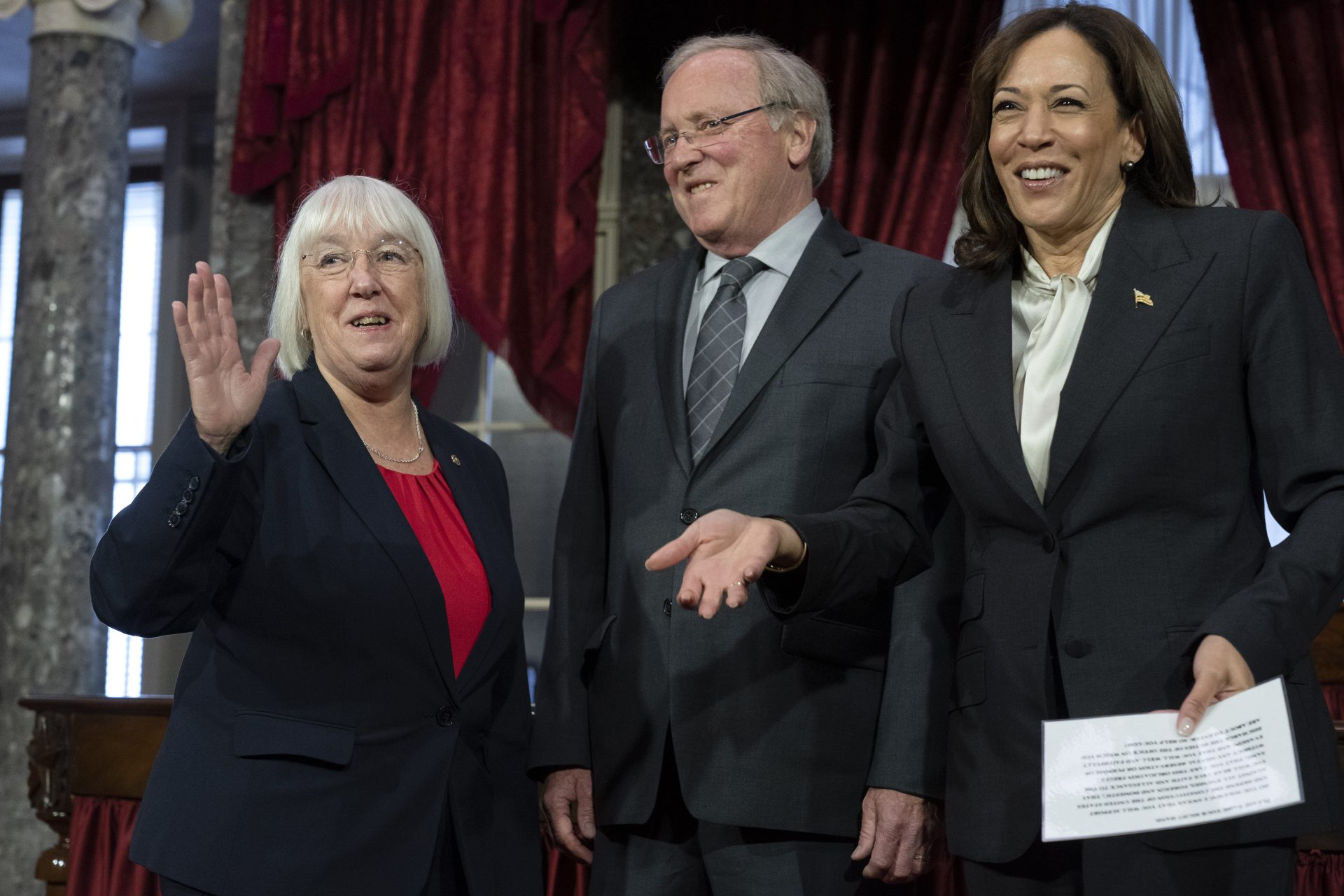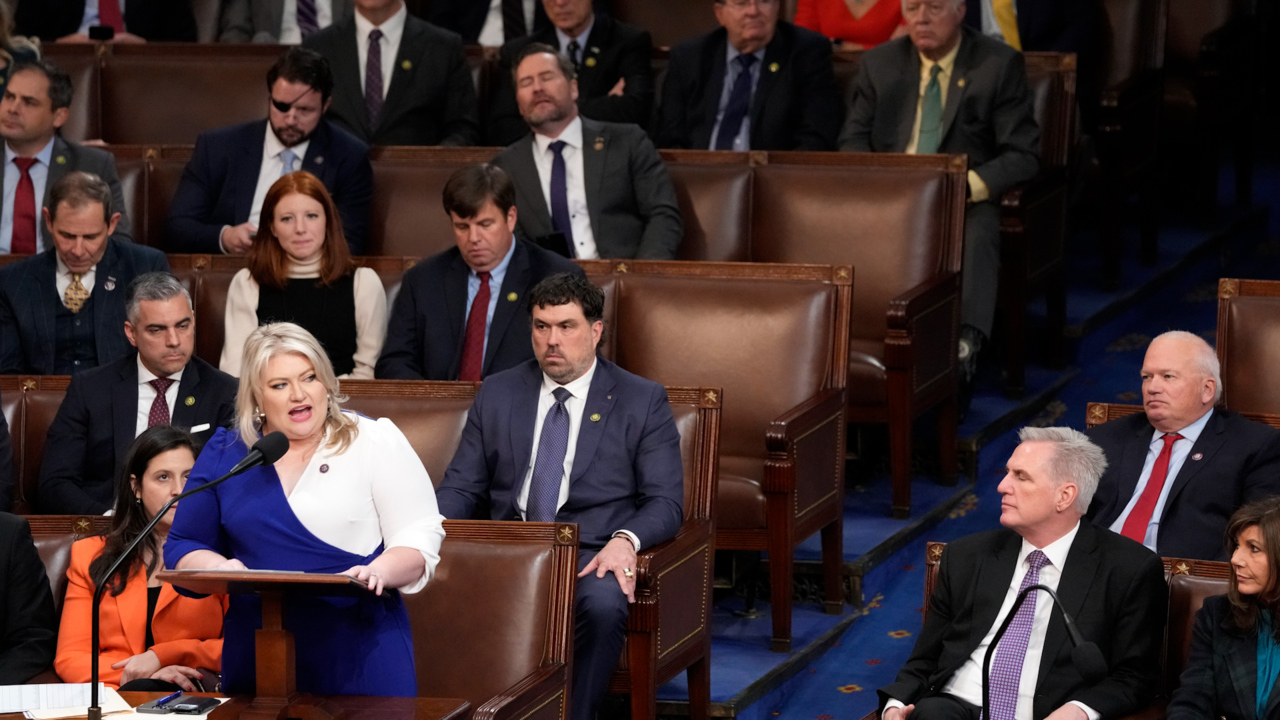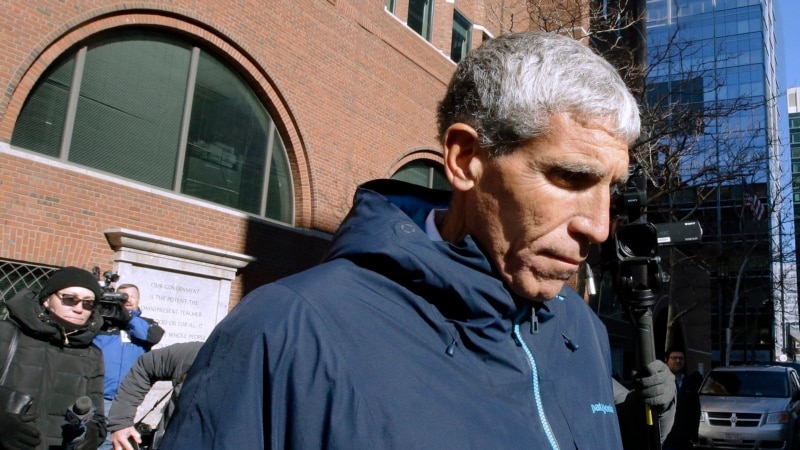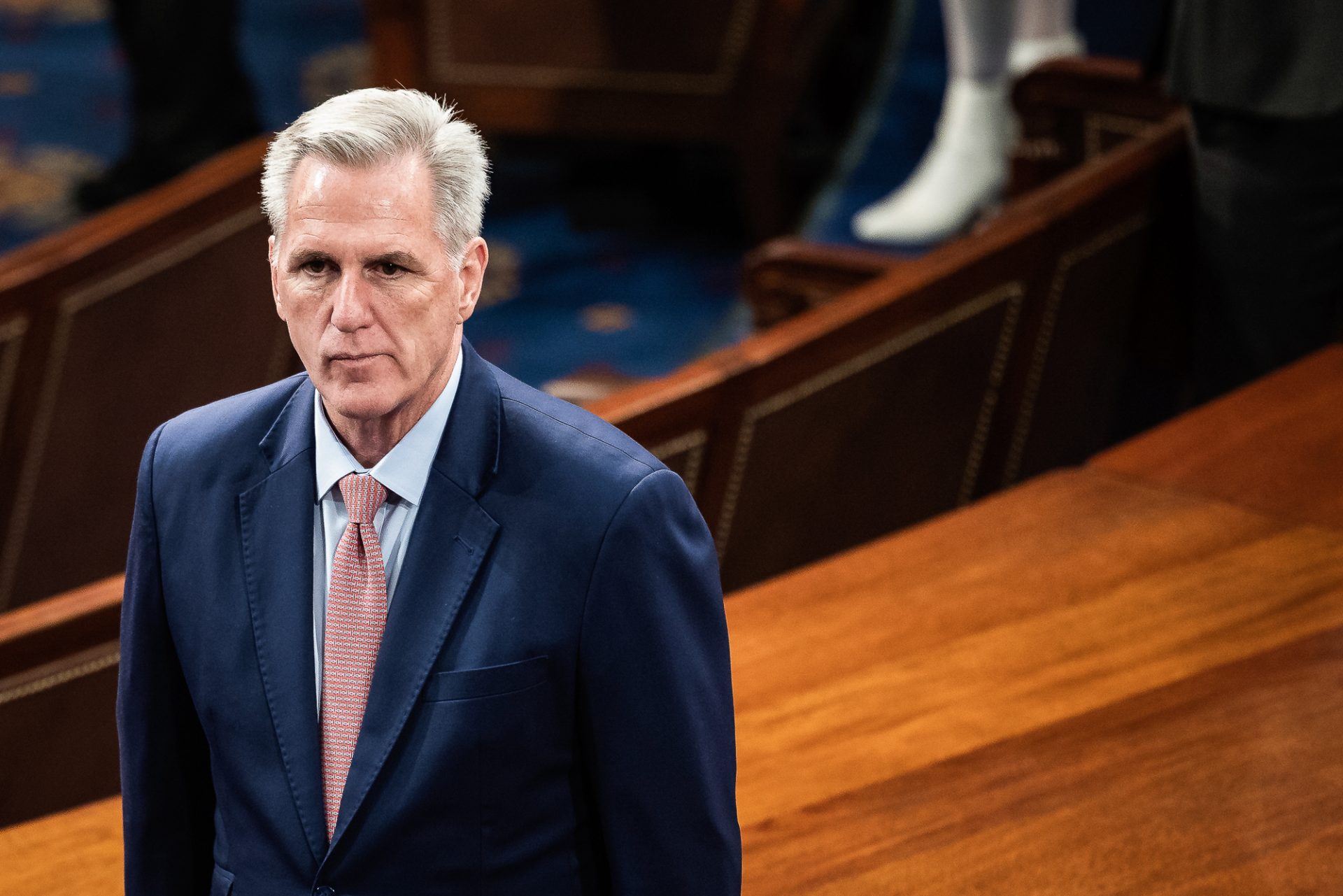US Top News and Analysis
Category: All
As speaker race drones on, Murray gets presidential succession boost
Politics, Policy, Political News Top Stories
Sen. Patty Murray (D-Wash.) may be the closest to the presidency she’ll ever get — even if it’s only for a brief moment.
That’s because the position of House speaker lies unclaimed for now with no timeline for a resolution. Murray, who assumed the position of Senate president pro tempore on Tuesday, therefore sits right behind Vice President Kamala Harris in the presidential line of succession until Republicans pick their speaker.
Murray said in a statement she is “truly honored” to assume the pro tem role, which is now held by a woman for the first time in history. Harris, the first woman vice president, administered the oath of office to Murray — wearing her trademark tennis shoes — on Tuesday as her predecessor, former Sen. Patrick Leahy (D-Vt.), stood behind her.
“It’s a responsibility I am deeply honored to take on for my country and for Washington state,” Murray said. “And I hope that when young women watch footage of the first female vice president — my friend Kamala Harris — swearing me in [Tuesday], they don’t question for a moment whether their voices matter, or if they belong in Congress. Because we need even more women to serve at every level of government.”
Murray has held her Senate seat since 1993 and most recently won reelection in November by a nearly 15-point margin.
Whenever the House does elect a speaker, Murray will shift back to third in line to the presidency after the vice president and speaker.
She’s also poised to lead the powerful Appropriations Committee, giving her major sway in directing hundreds of billions in federal spending.
“There is no one I trust more to be third in the line for presidential succession than Senator Murray,” Majority Leader Chuck Schumer said on the floor Tuesday. “She is brilliant, pragmatic and knows how to get things done.”
GOP Rep. Cammack accuses Dems of drinking alcohol during sixth speaker vote
Congress
GOP Rep. Cammack accuses Dems of drinking alcohol during sixth speaker vote
lead image
College Scam Mastermind Gets 3.5 Years in Prison
USA – Voice of America
The mastermind behind the nationwide college admissions bribery scheme that ensnared celebrities, prominent businesspeople and other parents who used their wealth and privilege to buy their children’s way into top-tier schools was sentenced to 3½ years in prison Wednesday.
The punishment for Rick Singer, 62, is the longest sentence handed down in the sprawling scandal that embarrassed some of the nation’s most prestigious universities and put a spotlight on the secretive admissions system already seen as rigged in favor of the rich.
Prosecutors had sought six years behind bars, while noting Singer’s extensive cooperation that helped authorities unravel the entire scheme. Singer began secretly working with investigators in 2018 and recorded hundreds of phone calls and meetings that helped authorities build the case against dozens of parents, athletic coaches and others arrested in March 2019.
Those sent to prison for participating in the scheme include “Full House” actor Lori Loughlin, her fashion designer husband Mossimo Giannulli, and “Desperate Housewives” star Felicity Huffman. Coaches from schools including Yale, Stanford, Georgetown and the University of California-Los Angeles admitted to accepting bribes.
“It was a scheme that was breathtaking in its scale and its audacity. It has literally become the stuff of books and made-for-TV movies,” Assistant U.S. Attorney Stephen Frank told the judge Wednesday.
The prosecutor called Singer’s cooperation in the case unparalleled but said it was also problematic, noting that Singer admitted to obstructing the investigation by tipping off several of his clients who were under government scrutiny.
Defense attorney Candice Fields said Singer took great personal risk by wearing a wire to record meetings and “did whatever was necessary” to assist the government in its investigation. Fields had requested three years of probation, or if the judge deemed prison time necessary, six months behind bars.
Singer apologized to his family, the schools he embarrassed in the public eye and others. He also promised to work every day of his life going forward to make a positive impact in people’s lives.
Singer pleaded guilty in 2019 — on the same day the massive case became public — to charges including racketeering conspiracy and money laundering conspiracy. Dozens of others ultimately pleaded guilty to charges, while two parents were convicted at trial.
Authorities in Boston began investigating the scheme after an executive under scrutiny for an unrelated securities fraud scheme told investigators that a Yale soccer coach had offered to help his daughter get into the school in exchange for cash. The Yale coach led authorities to Singer, whose cooperation unraveled the entire scheme.
Singer took in more than $25 million from his clients, paid bribes totaling more than $7 million, and used more than $15 million of his clients’ money for his own benefit, according to prosecutors.
Before Singer, the toughest punishment had gone to former Georgetown tennis coach Gordon Ernst, who got 2½ years in prison for pocketing more than $3 million in bribes.
Punishments for the parents have ranged from probation to 15 months behind bars, although the parent who received that prison sentence remains free while he appeals his conviction.
California braces for incoming bomb cyclone
Just In | The Hill
Story at a glance
Californians are preparing for yet another deluge of heavy rainfall after downpours on New Year’s Eve made flooded roads and knocked out power in swaths of the state.
The incoming storm is expected to drop the most rain in northern California on Wednesday and Thursday.
The messy winter storm will be brought by an atmospheric river which will meet with a front of rapidly decreasing air pressure to create a “bomb cyclone.”
Millions of Californias are preparing for more devastating flooding caused by heavy rain and snowfall this week.
A weather phenomenon called an atmospheric river will send a stream of moisture from the Pacific Ocean to the West Coast fueling heavy rain.
The atmospheric river will meet a front of low pressure that will in turn transform the storm into a “bomb cyclone.”
America is changing faster than ever! Add Changing America to your Facebook or Twitter feed to stay on top of the news.
The storm is expected to hit the California coast late Wednesday and Thursday bringing with it the risk of flash flooding, mudslides, as well as snow in some parts, according to the National Weather Service.
The heaviest rainfall is expected to hit northern California, most of which is under a flash flood watch.
Forecasters predict anywhere between two to 10 inches of rain to fall in the area between Wednesday and early Friday morning.
Forecasters also expect damaging wind gusts as fast as 60 miles per hour to impact large swaths of the northern part of the state.
Residual flash flooding from the storm could continue into the weekend, the agency said.
California Gov. Gavin Newsom (D) declared a state of emergency ahead of the winter storm on Wednesday authorizing the mobilization of the California National Guard.
“California is mobilizing to keep people safe from the impacts of the incoming storm,” said Newsom in a statement. “This state of emergency will allow the state to respond quickly as the storm develops and support local officials in their ongoing response.”
The storm comes shortly after heavy rain storms knocked out power and sparked flash flooding in northern California on New Year’s Eve.
On Saturday, 5.46 inches of rain fell in San Francisco making it the city’s second wettest day in over 170 years, according to the National Weather Service.
Climate Change, Changing America, Sustainability, Bomb cyclone, California, Gov. Gavin Newsom, National Weather Service Read More
Blackstone’s Wien and Zidle see mild recession, market bottom by midyear in annual ‘surprises’ list
US Top News and Analysis
Blackstone Vice Chairman Byron Wien said he thinks that a bottom for financial markets will arrive by mid-2023, followed by a drastic rebound, as the Federal Reserve’s battle against inflation would lead to only a mild recession. The Wall Street veteran published his much-anticipated annual surprises list Wednesday. Wien started the tradition in 1986 when he was the chief U.S. investment strategist at Morgan Stanley, and his list of surprises became a must-read on Wall Street. He now co-writes the list with Joe Zidle, chief investment strategist for Blackstone’s private wealth solutions group. Wien defines a “surprise” as an event that the average investor would assign only a 1-in-3 chance of happening but that he believes is “probable” with a more than 50% likelihood of taking place. “Despite Fed tightening, the market reaches a bottom by mid-year and begins a recovery comparable to 2009,” Wien said. The S & P 500 just suffered its worst year since 2008 with a near 20% loss and snapped a three-year win streak. The Fed has raised its benchmark interest rate to the highest level in 15 years and has signaled more hikes could come to bring soaring inflation under control. Wien said that while the Fed is successful in dampening inflation it “over-stays” its time in restrictive territory. Margins are squeezed in a mild recession, he said. The investor said the Fed’s tightening could push the fed funds rate above the personal consumption expenditures price index and result in positive real interest rates — a rare phenomenon in the last decade. Another Fed-related surprise Wien predicted is that the U.S. central bank will remain more hawkish than its global counterparts, causing a strong dollar against major currency pairs, including the yen and euro . “This creates a generational opportunity for dollar-based investors to invest in Japanese and European assets,” Wien said. On other topics, Wien said he expects a cease-fire in the war in Ukraine in the second half of 2023 as negotiations on a territorial split begin. He said he thinks China will edge toward its growth objective of 5.5% and work aggressively to reestablish strong trade relationships with the West. The market veteran also expects that Elon Musk will have Twitter “on the path to recovery” by the end of the year.
McCarthy’s political operation spent millions on lawmakers now opposing his speaker dreams
Politics, Policy, Political News Top Stories
Money can buy a lot of things. The speakership of the House may not be one of them.
In the 2022 election cycle alone, political groups affiliated with Rep. Kevin McCarthy (R-Calif.) spent over $1 million supporting Republican representatives who have now voted against him for speaker, according to a review of federal campaign finance records.
Of the 20 Republicans who voted for someone other than McCarthy — leaving the House in deadlock — 14 received a total of $120,000 in contributions from McCarthy’s leadership PAC, the Majority Committee, the filings show. That includes Reps. Dan Bishop (N.C.), Michael Cloud (Texas), Andrew Clyde (Ga.), Byron Donalds (Fla.), Bob Good (Va.), Andy Harris (Md.), Ralph Norman (S.C.), Scott Perry (Pa.) and Matt Rosendale (Mont.), along with incoming freshmen Anna Paulina Luna (Fla.), Josh Brecheen (Okla.), Andy Ogles (Tenn.), Eli Crane (Ariz.) and Keith Self (Texas).
The donations were among hundreds McCarthy spread around to the Republican conference and GOP challengers as he sought to help Republicans win the House majority in 2021 and 2022. Most candidates received the maximum $10,000 — $5,000 each for the primary and the general election — although a few only got support for the general election.
Reps. Andy Biggs (Ariz.), Lauren Boebert (Colo.), Matt Gaetz (Fla.), Paul Gosar (Ariz.), Mary Miller (Ill.) and Chip Roy (Texas) did not receive any contributions from McCarthy’s PAC in the last election cycle, although some have benefited from the political operation in the past. Most of the incumbents — with the exception of Boebert, whose contest went to an automatic recount due to its surprisingly close margin — faced easy paths to reelection in the midterms.
“This is not personal,” Roy said on the House floor on Tuesday.
In addition to McCarthy’s leadership PAC, the McCarthy-aligned House GOP super PAC, Congressional Leadership Fund, also threw its support behind some of the lawmakers who are now spoiling his speaker bid. Crane received $10,000 in contributions from CLF during both the primary and general election. Harris and Self each received $5,000 during their primary and general elections, respectively.
CLF didn’t just donate to Crane, however. The super PAC also spent over $900,000 on ads in support of him as he challenged incumbent Democratic Rep. Tom O’Halleran in Arizona’s 2nd District. Crane, a political newcomer backed by former President Donald Trump, went on to beat O’Halleran, who was one of the most vulnerable House Democrats in 2022 due to redistricting, by about 8 points.
One TV spot touted that Crane would “stand up to [President Joe] Biden and stop the spending.”
First, though, Crane is standing up to McCarthy.
As the main House Republican super PAC, CLF has spent heavily in previous elections bolstering other Republicans who are now playing the role of anti-McCarthy rebels. In 2020, the super PAC poured over $1.5 million into Perry’s race in Pennsylvania, targeting Democratic opponent Eugene DePasquale. It also spent $1.8 million opposing Democrat Cameron Webb, who was Good’s opponent in central Virginia. Perry won his election by 12 points, but it was a closer race for Good, who won by 5 points.
“Our job is not to coronate the biggest fundraiser or rubber stamp, the status quo, or keep on going along to get along,” Boebert said on the floor Wednesday, as she nominated Donalds during the fifth round of voting.
It’s unclear how many rounds of votes it will take to elect a speaker, given Republicans’ small majority and the relative lack of movement among those GOP lawmakers opposing McCarthy. During the first two rounds of voting on Tuesday, 19 lawmakers refused to back the GOP leader. That number grew to 20 by the third vote. The House then adjourned.
The fourth round of voting Wednesday saw all of the same lawmakers voting against McCarthy — plus Rep. Victoria Spartz (R-Ind.), who previously voted for McCarthy, voting present. She received $10,000 from the Majority Committee during the 2022 primary and general elections. And in 2020, when she held a key battleground district, CLF spent over $1 million on the race.
Bootcamp to help space startups clear regulatory hurdles
SAN FRANCISCO – A bootcamp aimed at helping startups navigate the space sector’s complex regulatory landscape is coming to New Mexico.
The Space Regulatory Bootcamp, backed by the U.S. Air Force Research Laboratory and SpaceWERX, is scheduled for Feb. 21-23 at Q Station, a collaboration center for New Mexico’s space industry in Albuquerque.
“Many companies need a lot of help understanding what is required if you’re going to do business with the federal government,” Gabe Mounce, director of AFRL’s Outreach and Tech Engagement Office, and SpaceWERX deputy director, told SpaceNews. “For instance, export laws are very important if you’re going to try to get a government contract, even a Small Business Innovation Research or Small Business Technology Transfer contract.”
In addition to export control, topics to be covered in the Space Regulatory Bootcamp, being organized by Washington-based Aegis Trade Law, include cybersecurity, foreign investment, crowdfunding, government licensing and federal contracting regulations.
“A lot of the work that we’ve done as a law firm has been educating our clients,” said Jack Shelton, Aegis co-founder and partner. “That’s what spawned the desire to put together a curriculum and start getting people educated on this stuff.”
Shelton, along with a group of space attorneys in partnership with AFRL, also are establishing the Association of Commercial Space Professionals, a public benefit company to offer affordable regulatory and legal resources for space startups.
Recent declines in launch costs and technological innovations like miniature electronic components and additive manufacturing have lowered the barriers to entry for space-related startups. Government agencies, eager to take advantage of commercial space innovation, have established incubators, accelerators and financing programs to help the startups succeed.
“It now feels like every entrepreneur who has ever tried to do something in any other sector is pivoting that product or service to space in some capacity, which is amazing,” Mounce said. “But that also means a lot of companies and founders don’t understand how they might be crossways with the U.S. if they are not careful in how they progress through their company establishment.”
One of the Space Regulatory Bootcamp sessions, for example, will focus on the important differences between pitching a business plan to the government versus pitching to investors, Shelton said.
While the first Space Regulatory Bootcamp was conceived as a pilot program, “I suspect because of the demand we are going to keep doing this,” Mounce said. “In fact, I’ve already been pushing the team figure out how we evolve the model after this pilot.”
Participants in the first Space Regulatory Bootcamp will pay $900 for the three-day meeting.
“We want to make sure it’s affordable,” Shelton said, “but also to make sure that we’re able to cover our costs.”
Correction: The Association of Commercial Space Professionals is a public benefit company, not a nonprofit.
This Zodiac Sign Is Bringing Major Main Character Energy to 2023—And More Astrological Shifts To Expect
Well+Good
Ready or not, an astrological revolution is on the horizon for 2023. Planetary shifts not seen in hundreds of years will be taking place, promising progressive change across the entire zodiac.
In this week’s episode of the Well+Good Podcast, astrologer and CosmicRx founder Madi Murphy is here to explain what you can expect from astrology in 2023.
Listen to the full episode:
While you might be ready to take on a new fitness regimen or reorganize your space for the new year, take some time to reflect on the prior year. Themes of collaboration and inclusivity will reign supreme in 2023, says Murphy, presenting opportunities for introspection and self growth.
Take it nice and easy. Use these first few months to meditate on your goals and visions for the year. You’ll be better equipped to tackle them head-on come springtime. “It’s a great time to plan, to plot, to look ahead,” says Murphy. “It’s really not the time to plant seeds or to start something new; it’s the time to reflect. What worked last year, what didn’t?”
Image: Well+Good Creative
While Murphy promises juicy transformations across the zodiac this year, Taureans are expected to experience glow-ups of epic proportions. Eclipses throughout 2022 caused some topsy-turvy, uncomfortable changes for the sign. Come May 16, however, Jupiter will move into Taurus, providing clarity and vision for the earthy sign. “Taurus is definitely going to have the main character energy on 1000,” says Murphy.
Revolution, too, is going to rock the zodiac this year, says Murphy. As Pluto moves into Aquarius and out of Capricorn, we’ll be experiencing the “wildest, most progressive revolutionary advances” of our lifetimes. Not since 1777 has the planet entered Aquarius’ rebellious arena—expect some much-needed changes in the collective.
“This whole year is going to be paradigm-shifting,” says Murphy. “The real theme for the year is ‘anything can happen.’ There’s going to be a lot of new energy.”
What does 2023 have in store for you? Check out the full podcast episode here, where Murphy dives deeper into her predictions for each sign.
Apple is raising the price of iPhone battery replacements
CNN
—
Apple is raising the price of battery replacements for all out-of-warranty iPhone models prior to the current iPhone 14 lineup, the company confirmed on its website.
Starting March 1, Apple
(AAPL) will charge $89 for battery replacements for iPhone X through iPhone 13 models, a $20 increase from the current price of a new battery. Battery replacements for other models, such as the iPhone SE and iPhone 8, will jump from $49 to $69.
Apple is also raising the cost of replacing batteries for other products. Batteries for newer iPad models will cost $20 more, while it will cost $30 more for a new MacBook Air battery and $50 more for MacBook Pro models.
Apple devices typically come with one year of warranty. The changes only apply to customers who are not part of its AppleCare+ repair service program, which provides up to two or three years of coverage and varies in cost depending on product.
Apple first lowered the price of iPhone battery replacements from $79 to $29 in 2018, after it was discovered that the company deliberately slowed down the performance of older iPhones to prevent sudden battery shutdowns. In response to the controversy, dubbed batterygate, Apple also issued a rare apology and agreed to a $113 million settlement with dozens of states.
In raising prices now, Apple may be responding to an uptick in the cost of products amid rising inflation and supply chain issues. By taking this step, Apple could also make it less attractive for customers to delay upgrading their devices or drive them to pay for the repair service program.
The news comes as Apple’s market cap fell below $2 trillion in trading on Tuesday for the first time since early 2021 and one year to the day after the company became the first public tech company valued at $3 trillion.
Like other tech companies, Apple has grappled with supply chain hiccups and concerns that recession fears could weigh on advertiser and consumer spending, including for pricier products like the iPhone.









